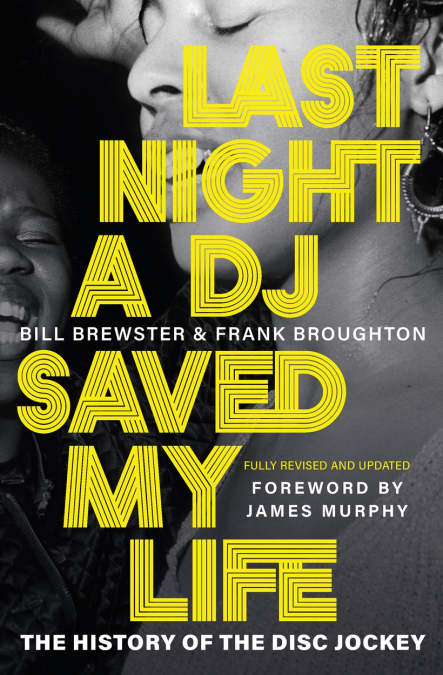One of the first club culture chronicles, and arguably the first biography of the DJ as an artist, the impact that Bill Brewster and Frank Broughton’s Last Night a DJ Saved my Life had on music writing was seminal.
Twenty-three years after its original publication, the book is back for an update. Rob Smith talks to Bill about the new edition and what readers can expect from remixing one of the dancefloor’s most iconic books.
Starting chronologically, the foreword in the new edition is written by James Murphy. Hearing people in the industry talk about Murphy, phrases like ‘strong-willed’ and ‘only does things his way’ tend to come up. How did you manage to get such an elusive figure on board?
We knew he was a big fan of the book. He sent me a Facebook message about eight years ago saying it changed the chosen musical course of his life. I was pretty blown away by that because I love LCD Soundsystem. To have someone with his profile, saying he was that much of a fan was amazing. When we were fishing around for ideas for forewords, I said, look, this is the message he sent so why don’t we ask him and see if he’s up for it.
A friend interviewed him about a year ago, mentioned the book to him and he gave this long effusive answer about what a revelation it was to read about disco. He’d always assumed it was people in polyester suits that liked terrible records. He had no idea about the underground aspect of it. I think he liked the punk-rock origins of disco really. It was much more gritty than the mainstream portrayal of disco.
Not just night fever… He’s a pretty great name to have on board as well in terms of crossover appeal, with LCD’s prominence in less rave-centric scenes.
Absolutely. He’s someone that loads of people that are not really into dance music would immediately recognise. Which is obviously great for us as when you’ve written a book, you want it to cross as many genre boundaries as possible.
Were there any sections of the book you revisited and thought really needed a remaster?
Not really, we’re really proud of the original book. It feels like you’ve had a child and they’ve gone out in the world, graduated from university, got a really good job and done really well. We had no idea it would get the reception that it did. I remember saying before it came out that it would be amazing if we sold 50,000 copies in our lifetime, that would be amazing. Now it’s already sold a lot more than that and has been translated into about nine different languages.
We have modernised it and added later chapters that deal with what’s happening now. We completely rewrote the Jimmy Savile parts, for obvious reasons. We know a lot more about who he was as a person now.
We also wanted to bring more female voices into the story wherever we could. We’ve carefully added new quotes from female DJs, female commentators that we know, and women in the industry to give it more of a female voice. I mean, it’s very difficult because it is essentially a male story: Many of the things that happened were happening in gay men’s clubs where there were almost no women.
So we were limited in what we could do. But we were really conscious of the fact that it was very male, and we wanted to try and even it out. So one of the chapters we added was a chapter on women in DJing.
I think I saw a quote about that from The Blessed Madonna about that chapter?
That’s right. We added that chapter and another one on jazz-funk, which had originally been part of the acid house chapter. We took it out, did a couple of new interviews and created a whole new chapter with it. Over the years, I’ve never stopped interviewing people. There are probably another 50 interviews that we’ve incorporated into the new book in different places.
Even now, if the opportunity comes up to talk to someone interesting, I’ll always do it. Even if I don’t necessarily know whether I’ll be able to use it straight away or stash it away in the bank.
While we made fairly subtle changes all the way through, we were very careful not to disturb the equilibrium of the original book. If we wrote it now from scratch, we’d probably write it slightly differently, but people have a lot of affection for the original and we didn’t want to ruin that. The changes we made, we’ve done so softly that I think most readers wouldn’t notice if they went back and re-read it.
I did some editing to bring down the word count as it was massive. A quarter of a million words! It was a bit of a whopper and before we could add things, we had to take some stuff away.
It certainly wasn’t like we felt we needed to make those changes, now we just have more information. When we wrote that book, it was all proper old school research. We were in the British Library, we were in the Performing Arts Library in New York, we were travelling to meet people in person. It was an old-school pre-internet way of doing it, going and looking through microfiche in the library, looking through our magazine archives.
But obviously, these days there’s more information out there now on the internet than there’s ever been, and we wanted to include some of it and update the book very subtly. I don’t think readers would really notice the update in a big way. Hopefully, they’ll realise that it’s just been tightened up a little bit maybe.
Almost like a smooth transition in a good mix?
Exactly!
Are there any chapters of the original you have a particular soft spot for?
The section that probably meant the most to me, and I think probably Frank as well, were the two chapters on disco. One of the things that we really wanted to do with the book (as well as telling the story of the DJ), was to put disco back at the heart of dance music culture.
It has always been written about so disparagingly that we felt it was time that we reset the idea and documented what really happened in early disco clubs, and how revolutionary they were.
There are just so many elements of disco that are still relevant. Editing, re-mixing, all of this stuff was started by disco DJs in the early 1970s. They’ve contributed so much to dance music culture, particularly to the world of house and techno. We wanted to sort of explain to people that disco is not terrible.
There’s more to it than groups like Boney M. There’s all this culture behind disco and it’s actually an incredibly inspiring style of music if you listen to it properly. So I’d say that one of the book’s aims was to put forward a case for disco being incredibly influential.
To finish, are there any bookshops you’re looking forward to seeing the book on the shelves in?
To be honest, it’s always nice to just walk into a random bookshop and see it. If I go into Rough Trade East, I fully expect it to be sold in there. But I’ve always loved Rough Trade East anyway: Of all of the typical places I might go to in London, it’s where you’d expect to see the book for certain.
But what I really like is when you go into a Waterstones in a little town somewhere and there’s a copy of your book there. I’m hoping it will get really wide distribution more than anything, so that if you go to Taunton, you’ll be able to get a copy, and if you go to Rochdale there’ll be a copy in the local bookstore there.
We’re lucky that we’ve got a reasonably influential publisher, who’s probably got the capability to do that. The first edition was in every bookstore that I went into when it was first out. What I’m hoping for is when I go home and see my family in Grimsby, there will be a copy of my book in a bookshop there. Every time I go there, I have a look and see if there are any of my books in there… there hasn’t been for years!



